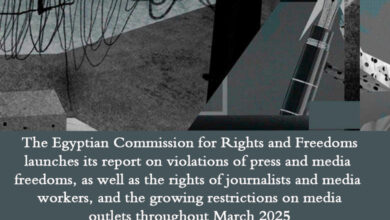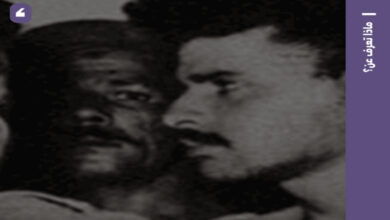Egyptian Commission for Rights and Freedoms calls for the release of the TikTok girls:
Their detention is a form of discrimination against women and restriction of the right to freedom of expression on the pretext that they violate the values of Egyptian family.

27 July 2020
The Egyptian Commission for Rights and Freedoms (ECRF) condemns the excessive use of arrests by Egyptian authorities against Egyptian women because of the content they publish via their pages on social media applications. The authorities deprive them of their freedom under loose charges and allegations including “incitement of immorality and debauchery” and “violation of the values of the Egyptian family.”
ECRF also denounces the restricting individuals’ freedom by imposing a specific moral conception or value system in a way that restricts their full enjoyment of their rights and freedoms protected by international human rights law. ECRF demands the immediate and unconditional release of detained women; and ending the prosecution of women, the restriction of their freedom, and controlling them and the content they publish on the internet or other means of expression and circulation of information under the pretense of preservation of “the values of society.”
These are actually the values envisioned by the Public Prosecution based on a conservative conception of what is acceptable and what is unacceptable for an Egyptian woman to say or show. This is a restriction of the right of Egyptian women to freedom of expression. It calls upon the Egyptian government to create a safe environment for women rather than prosecuting them and restricting their freedoms. It calls upon the National Council for Women to support the TikTok girls, and provide legal aid for them, and to intervene in order to preserve spaces for women and their right to freely express their opinion.
Lately, Egyptian authorities expanded its prosecution of women who present different forms of visual content via the TikTok application. Between April and July 2020, ECRF observed the arrest of eight women who present visual content via this application by security forces. The Public Prosecution ordered the detention of most of them on the basis of charges related to violating public modesty, incitement of debauchery and immorality, and assault on family values and principles.
On the 21st of April, security forces arrested Haneen Hossam who is one of the most famous users of the TikTok application. According to the statements of the Ministry of Interior at that time, her arrest took place because of her appearance in a video in which she incited others of debauchery and immorality. Until now, Haneen Hossam is under remand detention. Her detention is being renewed on time.
Since her arrest, security forces arrested seven other women because of using the same application. They include Mawada Al-Adham who was arrested on the 14th of May. She was accused of assault on family values and principles, and the administration of websites and accounts with the purpose of commitment and facilitation of crimes. On the 26th of May, the police arrested Menna Abdel-Aziz following her appearance in a video accusing two young men of rape and assault. The Public Prosecution decided to imprison her for four days. On the 9th of June, and as a result of responses to the rape incident, the remand detention of Menna was replaced by forcing her to stay and not to leave one of the shelters designed by the Ministry of Social Solidarity to protect and host women who are victims of psychological, social and economic violence. On the 11th of June, security forces arrested Shereifa Refaat – known as Sherry Hanem – and her Daughter, Nora. They were charged with committing the crimes of publication of indecent videos including sexual suggestions, assault on family values and principles in Egyptian society, and violation of the sanctity of private life, as well as other accusations related to violation of public decency and the administration of accounts with the purpose of committing these crimes.
On the 3rd of July, security forces arrested a girl known as Dina Marageeh as well as other six people following the spread of a video of her on YouTube being beaten amid a fight between her and some young men in the street. She, and the other people were released on the same day. Early in July, Manar Samy and Renad Emad were arrested from two different locations on the basis of the same charges: “presentation of videos that violate decency with the purpose of practicing prostitution; incitement of debauchery and immorality; creating a page with the purpose of committing a crime punishable by law; advertising one’s self for the practicing of prostitution; and incitement of others to commit the same acts, in violation of principles and values.”
ECRF believes that targeting women because of practicing their right to freedom of expression via the TikTok application is discrimination against women according to article one of the Convention on the Elimination of all Forms of Discrimination against Women. This articles defines discrimination as “any distinction, exclusion or restriction made on the basis of sex which has the effect or purpose of impairing or nullifying the recognition, enjoyment or exercise by women, irrespective of their marital status, on a basis of equality of men and women, of human rights and fundamental freedoms in the political, economic, social, cultural, civil or any other field.”
ECRF reminds the Egyptian government of its constitutional and international obligations to combat all forms of discrimination against women, and to protect their right to freedom of expression according to article 65 of the Egyptian Constitution of 2014, and according to article 19 of the International Covenant on Civil and Political Rights for 1966 which stipulates in its second paragraph that “everyone shall have the right to freedom of expression; this right shall include freedom to seek, receive and impart information and ideas of all kinds, regardless of frontiers, either orally, in writing or in print, in the form of art, or through any other media of his choice.” Also, affirms that inalienable rights and freedoms of citizen may not be suspended or reduced, and that no law that regulates the exercise of rights and freedoms may restrict them in a way that infringes upon their essence and foundation, according to article 92 of the Egyptian Constitution.





